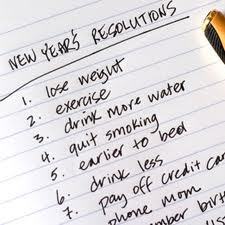
It’s the first week in January, a week filled with self-examination, determination, and the promise of a fresh start and a brand new year. As Americans, so many of the resolutions that we make concern healthy eating and physical fitness. We promise to banish carbs from our diets once and for all, start training for a marathon, or button those jeans that haven’t fit past our thighs in twenty years. While these goals are admirable, the truth is that they just aren’t realistic. And let’s face it: life without bread is just no fun, and if you hate running, maybe marathon training isn’t for you. The point is, setting goals for the new year is an excellent idea; the key is knowing how to do it so that you are most likely to be successful.
Our first suggestion is to make each goal a reasonable one. It’s highly unlikely that you’ll quit bread, pasta, and rice altogether, and we don’t think you should. Carbohydrates, especially the complex variety, provide fuel for the brain as well as a variety of vitamins and minerals. Instead of quitting them, why not try controlling your portions? For example, try to keep each serving of grains to the recommended one ounce equivalents. This means one slice of bread, or a half-cup serving of pasta or rice. If this seems difficult, use a measuring cup for a week or two until you are better able to approximate the right amount. This way, you still get to eat and enjoy these delicious carbs, but are still being mindful of the amount. The idea that we want you to grasp is to make goals ones that you can live with over an extended period so that they add up. Otherwise, you are more likely to get overwhelmed by an overly ambitious resolution and revert back to your old ways.
Another strategy you should use when goal setting is learn from your mistakes. It’s very likely that your New Year’s resolution is something that you have tried to accomplish before, so ask yourself, “What went wrong the last time I tried to meet this goal?” Figuring out your previous missteps or barriers to success and navigating around them will ensure that you are prepared for the roadblocks that will inevitably come your way. If you committed to running five days per week, but did not have the time to dedicate to it, then you now know to tweak your exercise plan accordingly. Also, attempt to learn from others. We are all different, but we are also all alike, so using someone else’s ideas in the formulation of your own plan might not be a bad idea.
Our last piece of advice sounds cliche, but it rings true. If you slip up, get back on track right away. We see many well-intentioned people in pursuit of the perfect diet, but that doesn’t exist. If you truly want to change the way that you eat, it will have to be long-term, during which mistakes are bound to happen. Learn from these mistakes, and over time you will develop a way of eating that contains more of the healthy stuff and less of the not-so-healthy stuff. Try to see the big picture: is that piece of chocolate cake you ate last night going to matter in a year? Probably not. Be kind to yourself, construct a plan that you can maintain, seek help along the way, and above all, enjoy the journey!
For more healthy eating tips or advice on setting healthy eating goals for the upcoming year, visit the newly named Academy of Nutrition & Dietetics website at www.eatright.org.
If you are looking to makeover your family’s eating plan this year, Family Food, LLC wants to help! Contact us by phone or e-mail (both available by clicking the ‘Contact" tab) or via Facebook and Twitter!
Don’t forget – you could be entitled to SIX FREE VISITS with a Registered Dietitian in 2012. Check out our ‘Services’ tab to see if your insurance carrier qualifies!
Facebook: http://www.facebook.com/pages/Family-Food/178786105530247
Twitter: http://twitter.com/#!/Familyfoodllc


[…] new year usually marks a time for new goals and resolutions. Many resolutions tend to involve health such as exercise more, eating healthier or maybe […]
[…] new year usually marks a time for new goals and resolutions. Many resolutions tend to involve health such as exercise more, eating healthier or maybe quitting […]